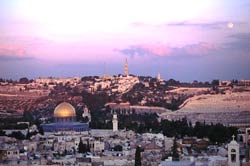|
|
Jerusalem:
Religion and Politics
January 2000 Commentary by Rick Francona
Historical Overview The region in which Jerusalem is located was first inhabited by the Canaanites, who came to the area from the Arabian Peninsula about 4000 BC. Control and sovereignty over the area has changed hands numerous times since then. Ownership of Jerusalem has always been an emotional subject, and remains so today. The Canaanites came under Egyptian rule in the 15th century BC, during the reign of King Thutmose III. After 200 years of rule by the Pharaohs of Egypt, the Jebusite tribe of the Canaanites retook the city. The Israelites under King David took the city from the Jebusites in 1000 BC and established a capital there. David's son Solomon built the first temple to house the cornerstone of the Jewish faith - the Ark of the Covenant. The city was attacked by the Babylonians under Nebuchadnezzar in 586 BC. The city, including the temple, was destroyed, and the Israelites were taken captive and enslaved in Babylon (in what is now Iraq). In 539 BC, Babylon was conquered by the Persians, who allowed the Jews to return to Jerusalem. The construction of a new temple was started on the ruins of the temple destroyed by the Babylonians. Jerusalem was captured by Alexander the Great in 333 BC, followed by the Ptolemaic Egyptians. A series of revolts gained autonomy for the Jews, but this was short-lived. The Romans took the city in 63 BC, losing it to the Persians for a short time, but regaining it. Herod was appointed king and was responsible for the restoration of the temple to its former greatness. When the Jews rebelled against Roman rule, the Romans destroyed the temple in 70 AD and dispersed the Jews (the Diaspora). The only remaining portion of the temple, a retaining wall now known as the Western Wall, has become a sacred spot for the Jewish religion. In 636, the city came under Muslim control. The Dome of the Rock and the Al-Aqsa Mosque were soon constructed on the temple mount, the same spot that had hosted the first and second Jewish temples. The Seljuks, a Turkish dynasty, ruled Jerusalem. In response to Turkish control of sacred Christian places, Pope Urban II called the first of the Crusades. Jerusalem fell to the Crusaders under Godfrey of Bouillon in 1099, and held it for just 90 years. At the historic battle of Hittin in 1187, the Kurdish general Salah Al-Din (Saladin) defeated the Crusaders and restored the city to Muslim control. In the 16th century, the Ottoman Turks took control of Jerusalem. Ottoman rule over the city and region was absolute and lasted until the defeat of the Ottoman Empire in World War One. British forces under the command of General Sir Edmund Allenby entered the city on 9 December 1917. The British became the legal administrators of Jerusalem under the terms of a League of Nations mandate in 1922. In 1947 the UN recommended that the British mandate of Palestine be divided into a Jewish state and a Palestinian state, and that Jerusalem be made an international city. The Palestinian Arabs rejected the UN plan. When Israel declared its independence in 1948, the Arab nations of Egypt, Syria, Jordan and Iraq began military action against the new country. In the fighting, the Jordanian army (Arab Legion) took the Old City of Jerusalem. Jordan maintained its control of the city until 1967. In 1967, Israeli forces seized control of the old city and Israel has maintained control ever since. Israel has named Jerusalem as its eternal capital, to the consternation of the Arab and Muslim world. An effort by Israel to have nations with embassies in Tel Aviv move them to Jerusalem has met with limited success. Arab nations have threatened boycotts against nations that recognize Jerusalem as the Israeli capital. Religious Significance Judaism: Jerusalem has been the center of the Jewish religion since the days of King David. The temple that David started and his son completed housed the cornerstone of the religion - the Ark of the Covenant. The Western Wall is the only remaining portion of the temple and a spot sacred to Jews. Christianity: Under Roman rule, the city became a destination for Christian pilgrimage. The Church of the Holy Sepulchre was built during the reign of Constantine the Great (303-337). The Church houses the spot believed to be the location of the crucifixion and resurrection of Jesus Christ. Islam: Jerusalem, called
Al-Quds ("the holy") in Arabic, is considered the third holiest site in
Islam. The Dome of the Rock (Qubbat al-Sakhrah) and Al-Aqsa ("the farthest")
mosque are built on the temple mount. The Dome of the Rock is the third
holiest site to Muslims. It was built over Al-Sakhra (the rock), considered
the spot where the prophet Muhammad ascended to heaven.
|
 The
city of Jerusalem is holy to three of the world's major religions - the
monotheistic faiths of Judaism, Christianity and Islam. Its status is further
complicated by political claims: both Israel and the Palestinian Authority
(the basis for a future sovereign Palestinian state) claim Jerusalem as
their capital city, and emphatically state that this claim is non-negotiable.
The
city of Jerusalem is holy to three of the world's major religions - the
monotheistic faiths of Judaism, Christianity and Islam. Its status is further
complicated by political claims: both Israel and the Palestinian Authority
(the basis for a future sovereign Palestinian state) claim Jerusalem as
their capital city, and emphatically state that this claim is non-negotiable.